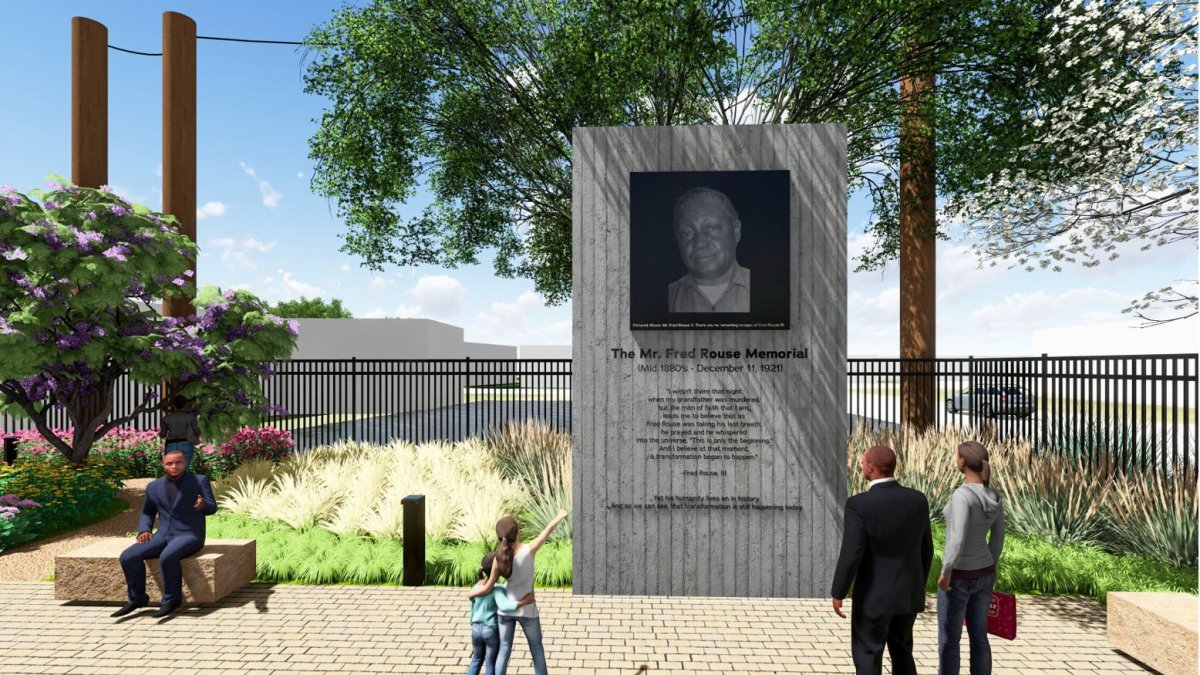“We’re trying to turn a site that was meant for evil and tragic terror and racial violence that was here, and we’re trying to turn that site into a site for peace,” said Fred Rouse III, standing on a plot in Fort Worth’s Northside neighborhood.
The site, at the corner of NE 12th Street and Samuels Avenue, was where Rouse’s grandfather was murdered more than 100 years ago, lynched and hung from the “death tree” that has since been torn down.
“My grandfather, when he was hung from that tree, on this land, he hung there all day. There were hundreds of people out here, people watching— nobody did anything. And so, the next morning is when family came and cut him down from the tree,” he said.
That was on Dec. 11, 1921. It is the only known lynching of a Black man in Tarrant County.
The Mr. Fred Rouse Memorial received its final funding $232,377 from the Fort Worth City Council a couple of weeks ago.
Rouse III said they have already started ordering construction materials and expect to have a memorial in place by the end of the year.
Bradley Borougerdi, a history professor at Tarrant County College, first began the process of erecting a memorial in 2018. He had just learned of Fred Rouse after seeing his name etched in steel at the National Memorial for Peace and Justice in Montgomery, Alabama.
“I’d been teaching about this stuff for over a decade of my life,” Borougerdi said. “When I saw this plaque that said Fred Rouse, 1921… it just really stirred something up in me.”
He remembered thinking that if he didn’t know about it, as an expert in the field with the highest education degree possible, others probably didn’t either.
“So, what chance does a business person, or a plumber or an electrician, or maybe somebody who didn’t go to college have of knowing about this?” he said.
And Borougerdi said it is important to know.
“What I’ve found is, when we talk about these difficult issues, they bring us together more,” he said.
Borougerdi said he and a few others formed the Tarrant County Coalition for Peace and Justice (TCCPJ).
They started researching Rouse, who worked at the Swift Company in the Fort Worth Stockyards.
“There was a strike going on, and Black people couldn’t join unions at that time, so he couldn’t have been part of the strike even if he wanted to,” Borougerdi said.
“He was going to work, and these people sort of like accosted him and said some things to him, and he apparently responded back that he would be there in the morning,” Borougerdi said.
When Rouse returned to work, Borougerdi said documents indicate he was attacked, pulled out a pistol and shot some of the strikers.
“And then they descended upon him and beat him to the point where they thought he was dead,” Borougerdi said.
He said officers loaded Rouse in the back of their car to take him to the morgue, when they said Rouse woke up. They then took him to the Black ward, the basement, of the city and county hospital.
Rouse was there for five days when a group of masked men dragged him out and brought him to the “death tree” at the corner of NE 12th Street and Samuels Avenue.
TCCPJ later found the property was for sale.
“And, we were like, ‘Wouldn’t that be interesting if we bought that land and turned it into a memorial?’” Borougerdi said.
They also found a living connection: Fred Rouse’s grandson.
“I was 46 years old when I got this one phone call that changed my entire life,” said Fred Rouse III.
It wasn’t until 2020 that Rouse III found out about his namesake and his own relatives in Fort Worth who wanted to meet him.
“That’s why I say that I believe that when my grandfather took his last breath, he said, ‘This is only the beginning.’ Because all this stuff had to happen, you know,” said Rouse III, who is now the president of TCCPJ.
